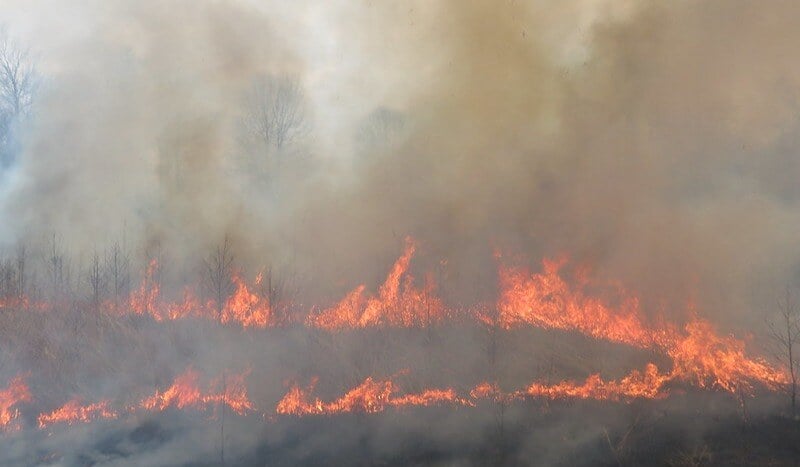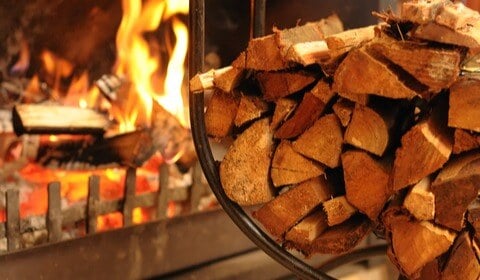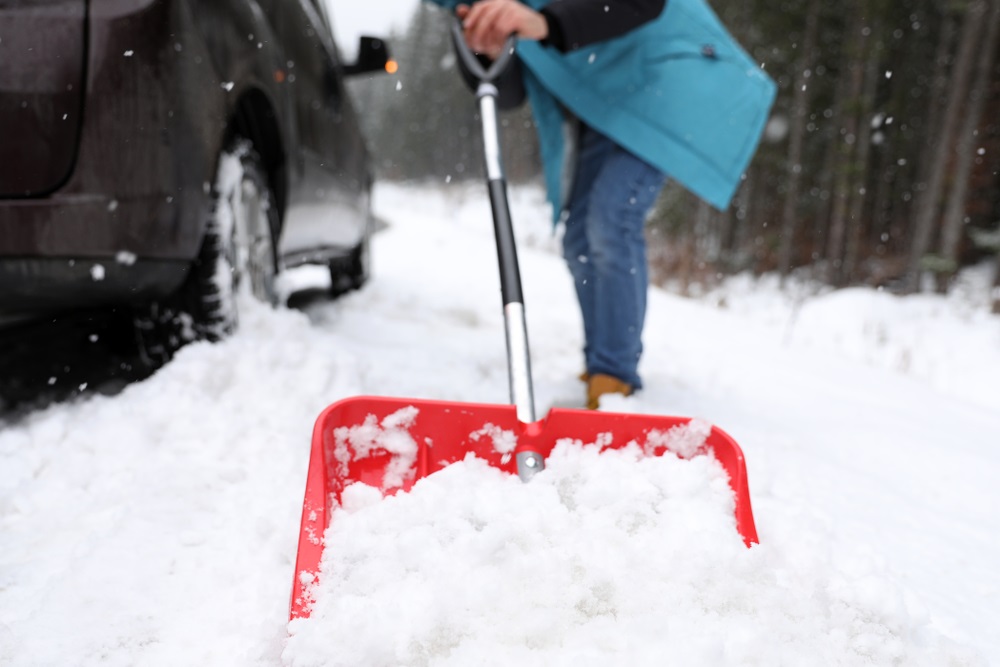
The smartest time to prepare for a winter storm is before one is in the forecast. A major winter storm can disrupt power, communication, travel. Whether you're new to Virginia or lived here for some time, we have some super helpful information to help you prepare and protect your family and your home.
How to Prepare for a Winter Storm in Virginia
Watch for news reports or sign up for smartphone storm alerts that will inform you of incoming severe weather so you have time to prepare. Winter storm warnings are typically issued between 12 and 24 hours before inclement weather arrives.
What's the difference between a Winter Storm Watch and a Winter Storm Warning?
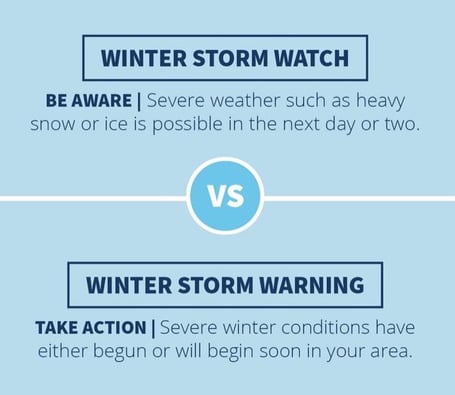
How to stay informed of winter weather in Virginia
Stay ahead of local weather, especially before you head out the door and get on the road. Track storms and make appropriate preparations for the worst-case scenario.
The VDEM has great resources for your family when a major winter storm is approaching Virginia. They also have an active Facebook page you can follow.
The National Weather Service for Virginia has social media communication channels in 4 regions:
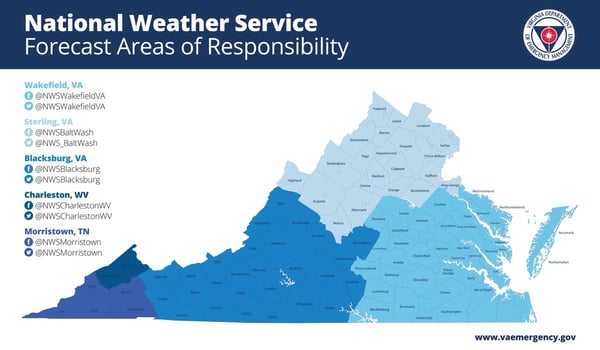
National Weather Service for Virginia and surrounding areas - X
Central Virginia: @WakefieldVA
Southwest Virginia: @NWBlacksburg
Northern Virginia @NWS_BaltWash
Tennesee: @NWSMorristown
West Virginia: @NWSCharlestonWV
National Weather Service for Virginia and surrounding areas - Facebook
Central Virginia: @WakefieldVA
Southwest Virginia: @NWBlacksburg
Northern Virginia: @NWS_BaltWash
Tennesee: @NWSMorristown
West Virginia: @NWSCharlestonWV
Prepare a winter car kit
Prepare your car for winter weather with regular maintenance including antifreeze, battery and tire checks, windshield wiper, and fluid replacement. Keep your vehicle’s gas tank full so you don't get stuck in an emergency and keep the fuel line from freezing. We have more travel safety tips!
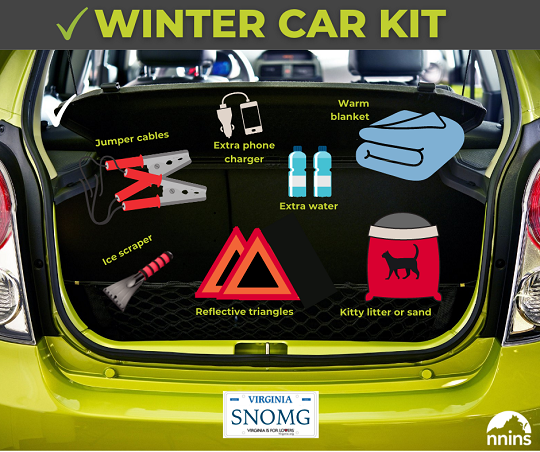
Avoid travel during winter storms
Virginians do not have many opportunities to practice driving in snow and ice. So what's the safest way to drive in snow and ice, especially if you rarely do it? Stay home if you are able. Before severe winter weather, check your lights, heater, hazard signals and windshield wipers to make sure all are working properly.
While it's sometimes unavoidable, there is no truly safe way to drive in heavy snow or ice. Prepare to travel after a winter storm by checking with transportation sources for up-to-date travel information.
Virginia Department of Transportation resources
The Virginia 511 Information System provides the latest traffic and road conditions by phone, website, and app.
The VDOT Safety Patrol provides free-of-charge services such as tire change assistance, fuel at the nearest gas station, jump starts, phone access, and directions.
Virginia State Police is active on Twitter: @VSPPIO and Facebook: @VirginiaStatePolice
Follow the Virginia Department of Transportation for local travel advisories on Twitter in your local area:
Northern VA @VaDOTNOVA
Staunton @VaDOTStaunton
Culpepper @VaDOTCULP
Richmond @VaDOTRVA
Bristol @VaDOTBristol
Salem @VaDOTSalem
Hampton Roads @VaDOTHR
Lynchburg @VaDOTLynchburg
Fredericksburg @VaDOTFRED
Follow the VDOT Facebook Page and join the following Facebook groups for local advisories:
- VDOT Fredericksburg District
- VDOT Salem District
- VDOT Hampton Roads District
- VDOT Bristol District
- VDOT Lynchburg District
- VDOT Culpeper District
- VDOT Northern Virginia District
- VDOT Richmond District
We are right here and ready to help!
Northern Neck Insurance 24/7 Claims Hotline
What to do if you get stranded in your car
- Stay put, call, and wait for help. Do not leave unless help is visible within 100 yards.
- Indicate you need help. Hang a brightly colored cloth (preferably red) on the radio antenna and raise the hood after the snow stops falling.
- Run the engine intermittently to keep warm, about 10 minutes each hour (or 5 minutes every half hour).
- Use the heater while the engine is running. Keep the exhaust pipe clear of snow, and slightly open a rear window for ventilation.
- Leave the overhead light on when the engine is running so that you can be seen.
- Do light exercises for circulation (avoid staying in one position for too long).
Check Virginia airports for travel delays
Click the links for updated flight information.
- Richmond Airport
- Reagan International Airport
- Washington Dulles Airport
- Roanoke Blacksburg Regional Airport
- Norfolk International Airport
- Newport News/Williamsburg International Airport
- Lynchburg Regional Airport
- Charlottesville/Albemarle Airport
- Shenandoah Valley Regional Airport
Have a family plan for Virginia winter storm
- Locate a homeless shelter if needed. Be prepared for COVID-19 questions and PPE.
- Wear layers of loose-fitting, lightweight, warm clothing that will keep you warm.
- Be prepared to evacuate if you lose power or heat and know your routes and destinations. Find a local emergency shelter at the Virginia Department of Emergency Management on Twitter and Facebook.
- Receive VDEM winter weather safety tips directly to your phone text SNOW to 247-211.
- Power up electronics. Keep your smartphone, tablet and computer batteries fully charged and have alternate power sources for your devices at the ready.
- Bring your animals inside and ensure that your horses and livestock have blankets, if appropriate, and unimpeded access to shelter, food, and non-frozen water.
- Build a VDEM-recommended emergency kit with extra batteries, food, water, prescriptions, etc.
- Locate copies of your insurance policy.
- Have family and emergency contact information available.
- Buy heating fuel early. If you wait too long to fill up, supplies might be limited, and if stormy weather has started, it may be unsafe to travel.
- Get extra cash. In a power outage, ATMs may not be working.
- Have a home inventory.
Stock up on supplies
- Battery-powered radio and extra batteries
- Snow and ice removal materials
- Plenty of wood for a fireplace
- A supply of food, warm clothes and medications
- Fuel for your car, heating, and for a generator if you have one
- Wood, pellets, kindling, lighters and matches to get you through an emergency.
Prepare to protect your pets
- Have extra pet food and water on hand plus any necessary medications.
- Make sure your pets are current on their vaccinations.
- Have a current picture on your phone.
- Ensure your pet wears a collar with identification and keep a leash on hand.
- Have properly sized pet carriers.
- Have a place to take your pet – kennels, veterinary clinics, and the homes of friends and relatives are all places you can take your pet in an emergency.
- Find a pet-friendly motel if you need to evacuate.
How to prepare your home for a winter storm
- Avoid waiting for the first storm of the year to prepare home equipment. Stock up and have snow blowers and generators serviced and any necessary repairs made.
- Make sure you have snow shovels and a roof rake on hand. Stock up on ice-melting compounds to melt ice on walkways and use pet-friendly ice melt if you have pets.
- Keep fuel for snow blowers and generators in approved safety containers and away from heat or flame-producing devices. Do not store fuel in your basement.
- Locate your home insurance documents and policy number, as well as contact information for your local agent. If you're a Northern Neck Insurance member, access your policy documents through our online member portal.
- Prepare the outside of your home for cold weather.
- Learn how to protect pipes from freezing and what to do if you think you already have a frozen pipe.
- Have working smoke and carbon monoxide detectors.
- Know what an ice dam is and what to do if you have one on your roof.
- Avoid using candles. Keep them at least 3 feet away from children, pets, and anything flammable if necessary.
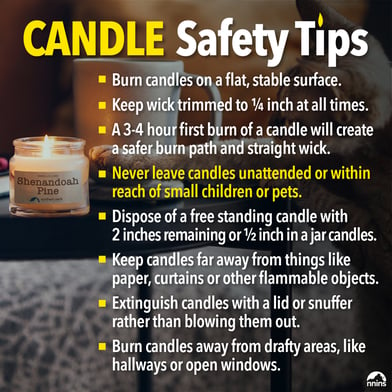
- If your home experiences damage during a winter storm call your local agent and report your claim on our Member Portal or by calling our 27/7 Claims Hotline at 877-968-7252. Read our frequently asked questions about home insurance claims.
Home heating equipment safety
- Forty-four percent of home fires are caused by space heaters every year.
- Fireplaces and chimneys are the second most common cause of home fires.
- Central heating units and water heaters make up the remaining home fires.
Follow these tips to protect your home from home-heating fires
- Wood or coal-burning stoves and electric or kerosene heaters are heat-safe when used correctly.
- Stoves must be properly vented and in good working order. Dispose of ashes safely. Keep a supply of wood or coal on hand.
- Electric space heaters must be UL-certified. Plug a heater directly into the wall and avoid using an extension cord. Unplug it when it is not in use. Use a kerosene heater only if permitted by law in your area; check with your local fire department.
- Use only the correct fuel for your unit. Properly ventilate the area. Refuel the unit outdoors only, and only when the unit is cool. Follow all the manufacturer's instructions.
- Maintain your fireplace/wood stove inspected annually. It should be properly vented and in good working order. Dispose of the ashes safely in a metal container and wait until cool to throw them away.
How to stay safe after a winter storm
How to take care of your home and community
After any severe storm, there could be damage, including downed trees on your property, power outages, broken glass, and more.
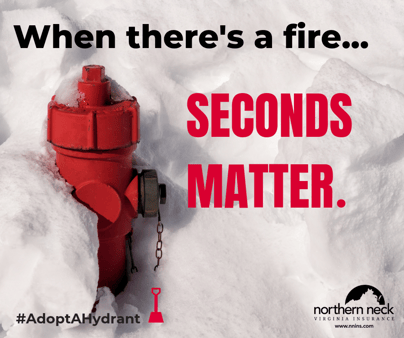
- Check on elderly or disabled neighbors and relatives.
- Remove snow and ice properly to prevent slips and falls around your home or business.
-
Clear your neighborhood fire hydrants.
- Avoid overexertion, such as shoveling heavy snow, pushing a vehicle, or walking in deep snow. The strain from the cold and the hard labor may cause a heart attack. Sweating could lead to a chill and hypothermia.
- Inspect your home for damage and take pictures.
- Be careful walking around damaged areas in your home.
- If you have weather damage to your home, contact your independent agent or our 24/7 Claims Hotline at 877-968-7252.
- Check our Storm Damage Claim FAQs for the first steps to take after damage to your property.
-
Ensure that all exhaust vents at your home are free from snow and ice. Accumulation of snow around outdoor vents can quickly obstruct them, causing carbon monoxide to build up inside your home.

How to report a power outage
The best way to report and track a power outage in your area is online unless there is an electrical hazard. Electric utility companies get otherwise inundated with phone calls. Click on the links below to report an outage online and for information about electric utilities in your area.
- Dominion Energy 866-366-4357
- Northern Virginia (NOVEC) 888-335-0500
- Appalachian Power 800-956-4237
- Shenandoah Valley Electric (SVEC) 800 234-7832
- Southside Electric (SEC) 866-878-5514
- American Electric (AEP) 800-277-2177
- Rappahannock Electric (REC) 800.552.3904
- Community Electric (COMELEC) 757-242-6181
-
FirstEnergy 888-544-4877 (Call to report hazards only-report outages online)
Snowplowing In Virginia
VDOT's clearance goals after a storm ends allow for one passable lane on all subdivisions:
- 2-4” of snow: 24 hours
- 4-6” of snow: 48 hours
- 6” or more: More than 72 hours
Check out this helpful video from the Virginia Department of Transportation about plowing roads. You can also see when the roads in your Virginia community are plowed with VDOT's Online Snowplow Tracker Tool.
Wondering why you see trucks sometimes drive with their plows up? They may be spreading sand & salt. May be out of materials and heading back for a refill. Or, operators may be enroute to assigned area. Your patience is appreciated!
Driving safely on Virginia roads after a winter storm
Prepare to drive safely following a storm with the following tips:
- Adjust your commute and telework if possible.
- Remove ALL SNOW AND ICE from your car before driving including sensors and cameras.
- Monitor forecasts closely.
- Avoid travel unless absolutely necessary, especially when black ice is indicated.
- Drive the conditions.
- Ensure you have enough gas, wiper fluid, proper tire tread, food, water, and required medication in an emergency kit.
- Give snowplows room to work.
- Please be patient and allow extra time to travel.
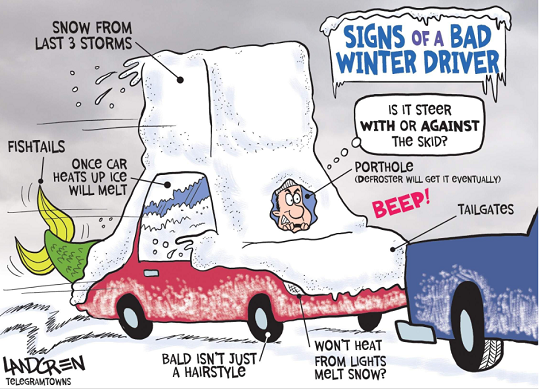
Thoroughly clean off your car
Maybe you've been the victim of snow chunks flying into your windshield from another driver who did not take the time to properly clear their vehicle or you have been the offender because you were in a hurry. This can create a dangerous situation and cause reduced visibility, broken windshields, and even death has occurred from missing this crucial step. It doesn’t just help the drivers around you: cleaning off your own vehicle increases your road visibility and lessens your chance of a collision.
Here are a few tips to do it right:
- Check to see that the tailpipe is free of snow. This can lead to carbon monoxide build-up.
- Turn on your defroster. While you wait, clear the roof, hood, trunk lid, side windows, and rear windows. If your car is completely covered, check your headlight, tail lights, and turn signals.
-
Dry your wiper blades and make sure your wiper fluid nozzles are clear. They’ll have a lesser chance of icing over during the next storm.
- Use the smooth side of a plastic ice scraper to clear frost. For a thicker coating, use the ridged side of a plastic ice scraper for the windshield. Make vertical cuts down the window and scrape across the window surface to break up the snow or ice.
-
Never pour hot water or use anything sharp on a car covered in ice. The rapid temperature change causes the glass to crack or shatter. Sharp items will scratch or shatter the glass.
-
Moisture in your car can cause fog to build up. Set your air vent to fresh rather than recirculate, and consider using your air conditioner for extra pesky days. They are designed to remove moisture and can do this even with the heater on.
Report winter road hazards
Waze, the navigation app, developed a new "hazard" to report unplowed roads and black ice after VDOT suggested it might be helpful to drivers. This is really handy for side roads and communities. Just tap on Hazards > Weather > Unplowed Road.
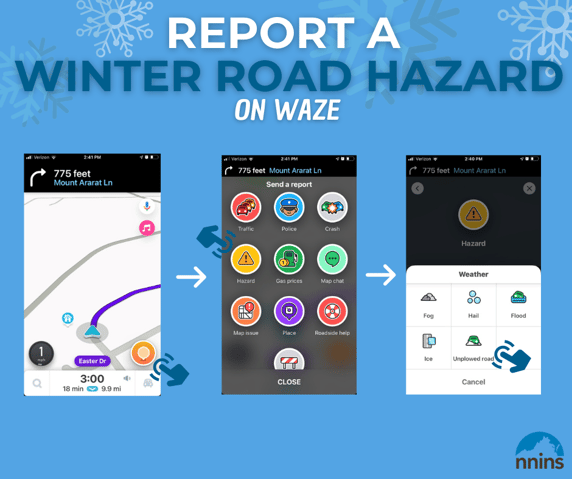
As a Waze for Cities Data partner, VDOT plans to monitor reports coming in from Wazers and those who are simply shoveling their driveways and sidewalks this winter and determine how they can incorporate this data into their operations for the following winter.
Please don't report hazards while you're driving. You can also report a road issue at 1-800-367-7623 (FOR-ROAD). For life-threatening emergencies, please dial 911.
Stay safe and let us know if we've left anything out! And let us know how we can serve you. We're close by and ready!
Northern Neck Insurance Company
24/7 Claims Hotline
Sources:
https://ibhs.org/members/winter-weather-social-resources/
https://www.vdot.virginia.gov/
https://ibhs.org/members/winter-weather-social-resources/
Learn more about homeowners insurance in Virginia
Learn more about car insurance in Virginia
THE NORTHERN NECK INSURANCE INTEGRITY PROMISE — We pledge to provide straight talk and good counsel from our NNINS Virginia insurance experts through our blog. While we hope you find this to be a helpful source of information, it does not replace the guidance of a licensed insurance professional, nor does it modify the terms of your Northern Neck Insurance policy in any way. All insurance products are governed by the terms in the applicable insurance policy.

